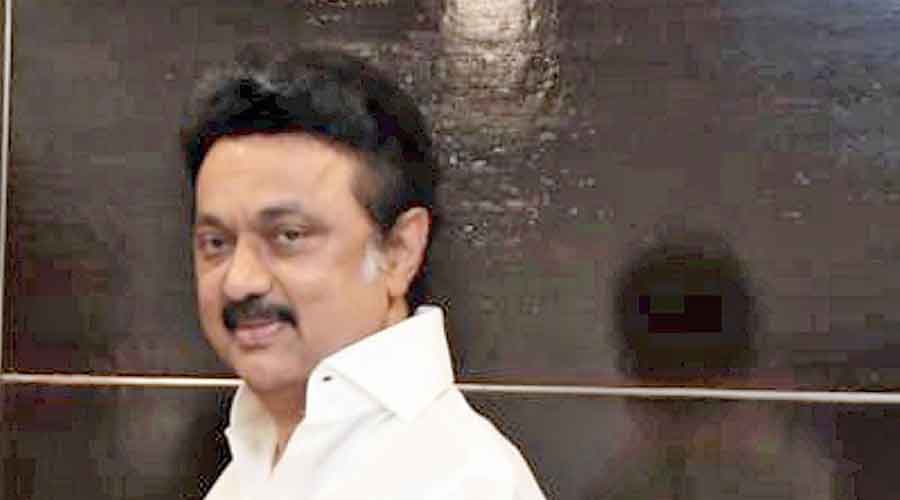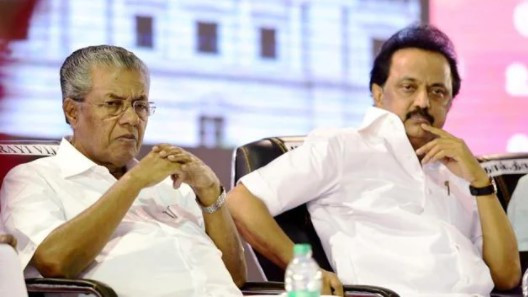Does calling a spade a hoe blunt its edge?
The Tamil Nadu BJP is in uproar because the new DMK government has been referring to the Government of India as “ondriya arasu” (Union government) instead of the conventional “mathiya arasu” (central government) in all official communication.
William Shakespeare would surely not have objected if he knew Tamil, since both terms refer to the same entity and are interchangeable in common parlance. But to the state BJP, the change of wording does not smell so good.
The DMK has explained that “Union government” emphasises the federal nature of the Indian Union while “central government” inspires visions of “over-centralisation” — of a concentration of all power in one entity.
It’s precisely this that’s got the BJP’s goat. The party has attributed the change of phraseology to sinister “motives” of “demeaning” the Government of India and passed a resolution condemning it at a meeting attended by Union minister of state V.K. Singh.
Party hardliner Karu Nagarajan has threatened to move court while senior functionaries such as state unit general secretary K.T. Raghavan have trained their guns on chief minister M.K. Stalin.
They have claimed that Stalin’s predecessors in the DMK, such as his father M. Karunanidhi or party founder C.N. Annadurai, did not use “Union government” to refer to the government in Lutyens Delhi.
An unruffled Stalin replied to the charges in the Assembly on Wednesday, saying: “Some are trying to portray the use of ‘ondriya arasu’ by us as some kind of a social crime. It is not so. Our usage is legal and perfectly in accordance with the letter and spirit of the Indian Constitution.”
Stalin underlined that “India that is Bharat shall be a Union of States” is the very first line in the Preamble to the Constitution.“We are using the words (‘Union government’) precisely in that sense and not as something that is not there in the Constitution,” he said.
He denied that the usage was a departure from past DMK practice. “The DMK had used the term ‘Indian Union’ in its very first election manifesto in 1957 to refer to the Government of India,” Stalin said.
The Government of India is not known to refer to itself as “Union government” in its orders or communications, using mostly “Government of India” but also “Union of India” in legal contexts and “Republic of India” in foreign affairs.
Stalin’s reply did not end the controversy. Two days later, the state BJP’s executive committee met and passed a resolution accusing the DMK of “demeaning the central government” by referring to it as “Union government”.
“The BJP considers that while there is no crime in saying ‘Union government’, there is some other intention behind the DMK’s use of that term,” the resolution added.
Observers suggested the BJP’s stand reflected the RSS notion of India as “one entity” from Kashmir to Kanyakumari, with the states having been formed only for “administrative purposes”.
A retired bureaucrat in Calcutta drew a parallel with the decision by the framers of the Constitution to drop the use of “province” — as was the practice under British rule — for “state”.
He said the Founding Fathers believed that “province” connoted remoteness from the centre of things and denigrated the states’ sovereignty, picturing them as mere administrative divisions whose powers could be taken away at will.
The veteran civil servant, who did not wish to be quoted, added that in its communications with the Bengal administration, the Government of India “more often than not” referred to itself as “central government”.
Some observers suggested that the BJP’s anger stemmed partly from a longstanding perception among some that any emphasis by the DMK on the states’ powers or autonomy was imbued with a desire for “secession”.
However, the DMK had under Annadurai given up its “Dravida Nadu” demand way back in 1962 following the Chinese aggression and fully supported the war efforts of the then Congress government in Delhi.
In his Assembly reply, Stalin cited a speech Annadurai had delivered in the Rajya Sabha in December 1963 (during the debate on the Constitution’s 16th Amendment Bill that sought to ban political parties advocating secession from contesting elections) that had made the DMK’s position on Centre-state relations clear.
Quoting from Annadurai’s speech, Stalin said: “The Preamble to the Constitution says that the political sovereignty rests with the people. Then ‘legal sovereignty’ is divided between the federal union and the constituent units (states).”
Annadurai had stressed in his speech that the framers of the Constitution “wanted a federal structure and not a unitary structure”.
Stalin also recalled the words of the late C. Rajagopalachari, the only Indian to hold the post of governor-general and who later became a minister in Jawaharlal Nehru’s cabinet, that “true federalism” would become a reality only when the “enormous powers concentrated at the Centre” were diluted.
“There is nothing illegal in our use of the term ‘ondriya arasu’ and there need be no hue and cry about it,” Stalin said.
He said the expression succinctly captured the “federal” spirit of the Constitution and emphasised his government would “continue to use it”.
Additional reporting by our Bengal bureau












